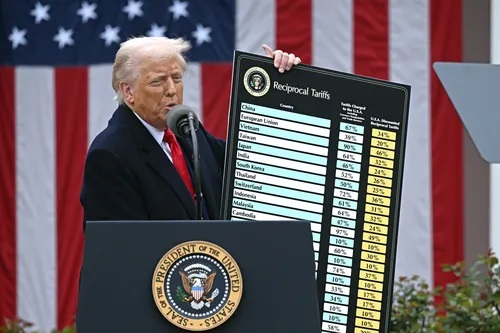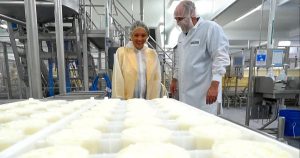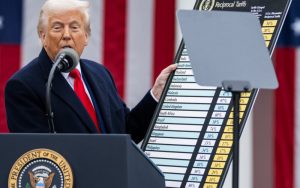
U.S. President Donald Trump’s tariffs have grabbed the headlines since they went into effect early this month. While the president is charging forward to restructure international trade, politicians, citizens, and agriculture groups have been vocal about where they stand.
Dairy leaders called for a targeted approach to tariffs and an emphasis on positive negotiations with most trading partners as the Trump Administration moved ahead with a plan for stepped-up tariffs worldwide.
“Tariffs can be a useful tool for negotiating fairer terms of trade,” said NMPF President & CEO Gregg Doud in a joint statement with U.S. Dairy Export Council President & CEO Krysta Harden released earlier today. “We are glad to see the administration focusing on long-time barriers to trade that the European Union and India have imposed on our exports. The administration has rightly noted both countries’ penchants for restricting sales of American products.
“In fact, 20% reciprocal tariffs are a bargain for the EU considering the highly restrictive tariff and nontariff barriers the EU imposes on our dairy exporters,” Doud continued. “If Europe retaliates against the United States, we encourage the administration to respond strongly by raising tariffs on European cheeses and butter. We also appreciate the President’s recognition of the sizable barriers facing U.S. dairy exports into the Canadian market.”
Through productive negotiations, Doud says the Trump administration can help achieve a level playing field for U.S. dairy producers by tackling the numerous tariff and nontariff trade barriers that bog down U.S. exports.
“As the administration moves forward with negotiations on these tariffs, we encourage prioritizing getting back to fully open trade with U.S. FTA partners, targeting actors who have long put up entrenched barriers to American exports, and swiftly negotiating constructive outcomes with those we know are working for a long-term, fruitful relationship with American farmers.”
Last week, President Trump announced that the U.S. will impose a baseline 10 percent additional tariff on imports from all countries, with a higher additional tariff taking effect next week on dozens of other countries the United States believes have the most unfair trade relationships with the U.S.
The new duties include a 34 percent tariff on China, 26 percent on India, 26 percent on South Korea, 24 percent on Japan and 20 percent on the European Union. Canada and Mexico, the two largest U.S. dairy trade partners, are currently exempted from the latest round of tariffs because both countries’ non-USMCA-compliant products already are subject to 25 percent tariffs that Trump imposed, then largely suspended, last month, the groups reported.
US Senators speak out on unfairness
A group of senators from both sides of the aisle, sent a letter to Department of Commerce Secretary Howard Lutnick, Department of Agriculture Secretary Brooke Rollins and U.S. Trade Representative Jamieson Greer speaking out on the imbalance of trade in the USMCA agreement.
“Historically, Canada has failed to live up to its commitments to provide access to its market; this remains the case even with new provisions in the United States-Mexico-Canada Agreement (USMCA),” Sens. Tammy Baldwin, D-Wis.; Roger Marshall, R-Kan.; and Joni Ernst, R-Iowa, wrote. “Canada continues to manipulate access to its dairy market by reserving the vast majority of shares of their Tariff Rate Quotas (TRQs) for Canadian processors, causing fill rates to remain low across several dairy product categories, including whey powder, milk powder, and cheese for industrial use.”
The senators noted that the dairy sector in Canada operates under strict and predetermined circumstances. These include limits on production, pre-set prices and restricted imports, in order to guard the country’s supply management system.
Recent changes to the trade agreement were expected to improve this access to an extent, but the lawmakers claimed, “Canada is not fulfilling their commitments.”
“For years, Canada has been skirting the rules and cheating American dairy farmers and businesses out of fair access to their market. We cannot miss this opportunity to help level the playing field, and I’m ready to work with President Trump to protect and grow Made in Wisconsin dairy and ensure fairness for our farmers,” Baldwin told Fox News Digital in a statement.
Ranch group thankful for cattle, beef and lamb tariffs
R-CALF USA, the nation’s largest nonprofit trade association representing independent cattle and sheep producers, applauded President Trump’s universal 10 percent tariff on all imported goods stating that the tariffs are needed to reverse the ongoing and rapid contraction of both the U.S. cattle industry and sheep industry.
“Our nation’s cattle and sheep sectors are losing farms and ranches at an alarming rate, with census data showing our beef cattle operations disappeared at the rate of over 21,000 farms and ranches per year during the five-year period between the two latest censuses. Tariffs will help put an end to the globalists’ practice of using cheaper imports to reduce demand for domestic cattle and sheep, which causes domestic farms and ranches to fail,” said R-CALF USA CEO Bill Bullard.
R-CALF USA says its been aggressively supporting livestock tariffs as legitimate economic tools to rebuild domestic livestock industries so America can remain near self-sufficient in the production of beef and lamb.
The ranch group is also asking for tariff-rate quota systems to complement tariffs. Tariff-rate quotas are limits set on the volume of imported beef or lamb that can enter the U.S. market.
“Both our cattle and sheep industries need ‘space’ from the downward price pressure of cheaper imports to incentivize domestic herd expansions, investments in feedlots and packing facilities, and to attract new entrants into the industry,” Bullard said.
In recent letters to the Trump administration, R-CALF USA also asked for a tariff-rate quota system that would limit current beef imports by 1.5 billion pounds and substantially limit lamb imports to allow the domestic sheep industry to reclaim at least 50 percent of the domestic lamb market.
The ranch group also asked for a 25 percent tariff on imports of live cattle from Canada and Mexico.
You can now read the most important #news on #eDairyNews #Whatsapp channels!!!
🇺🇸 eDairy News INGLÊS: https://whatsapp.com/channel/0029VaKsjzGDTkJyIN6hcP1K

























